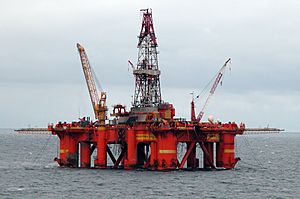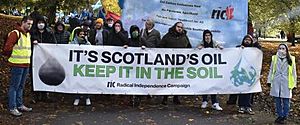It's Scotland's oil facts for kids
"It's Scotland's oil" was a famous political saying. The Scottish National Party (SNP) used it a lot in the 1970s. They used it to argue for Scottish independence. The SNP believed that oil found in the North Sea off Scotland should mostly benefit Scotland. They felt Scotland was not getting enough money from this oil while part of the United Kingdom.
The SNP used this slogan in the February 1974 and October 1974 UK General Elections. In February, the SNP won seven seats in the House of Commons. They also got 22% of the votes in Scotland. By October, they had eleven seats and 30% of the vote. This slogan is still talked about today. People wonder if an independent Scotland could be financially strong with its oil.
Contents
Why the Slogan Became Famous
The February 1974 election led to the Labour Party winning the most seats. Harold Wilson became Prime Minister. The previous Prime Minister, Edward Heath of the Conservative Party, lost support. He tried to work with the Liberal leader, Jeremy Thorpe, but it didn't work. Labour then formed a government without a clear majority. In October 1974, new elections were held.
Support for the Scottish National Party had been growing. This started after Winnie Ewing won a special election in Hamilton in 1967. The 1974 elections were a time of big political changes in the UK. This helped the SNP become more well-known. That's when "It's Scotland's oil" became very popular. Many believe this slogan helped the SNP win more seats.
North Sea Oil and the Economy
Oil was found in the North Sea in the 1960s. Production started in the 1970s. Most of the big oil fields in the UK were near Scotland. They were north and east of the Scottish mainland. Some were even east of the Orkney and Shetland Islands.
Aberdeen became the main city for Britain's North Sea oil business. Many oil terminals were built. These included places like Sullom Voe in Shetland and Flotta in Orkney. Others were at Cruden Bay and St Fergus on Scotland's northeast coast.
In the early 1970s, the economy was struggling. The 1973 oil crisis happened because of the Yom Kippur War. This led to higher prices, many people losing jobs, and a recession. This mix of problems is called stagflation. It affected Scotland and the rest of the UK. The SNP argued that Scotland didn't control the money from its oil. They said this was because Scotland was part of the UK.
Understanding the Oil Claim
Scotland is not an independent country. So, it doesn't have its own official sea borders. Any claims Scotland makes are part of the United Kingdom's claims. However, Scotland has its own legal system, called Scots law. This is different from English law used in England and Wales.
Because of this, UK law divided the North Sea into Scottish and English parts. The Continental Shelf Act of 1964 helped define these areas. It said that the North Sea area north of 55 degrees north latitude was under Scots law. This meant about 90% of the UK's oil was considered to be in the Scottish area. Later laws also helped define "Scottish waters."
Experts like Kemp and Stephen (1999) tried to guess how much oil money Scotland would get. They used a method called the equidistance principle. This method is used by the United Nations Convention on the Law of the Sea. It helps new countries define their sea areas. It also helps solve sea border arguments between countries.
Their study showed that Scotland's share of oil money would change. It would depend on oil prices. It would also depend on how much it cost to find and develop the oil.
However, Scotland's share of North Sea oil money is not officially counted. The UK government sees it as "extra-regio" resources. This means it's not part of Scotland's regular finances. But, the Barnett formula does give Scotland more money per person for public services. This is partly because Scotland contributes a lot of tax money from oil. This extra spending has been slowly reduced over time. This is known as the "Barnett Squeeze."
Claims from Orkney and Shetland
Some people in Orkney and Shetland want more control over their areas. They want a bigger share of the oil money. They argue that most of the oil is found in the waters around their islands.
However, this idea might not be fully correct. These islands would likely get a smaller sea zone within a larger Scottish sea zone. This is similar to how sea borders are decided between countries.
Oil and Scottish Independence
Jim Sillars is a former Deputy Leader of the Scottish National Party. During the 2014 Scottish independence referendum, he made a strong statement. He said that if Scotland became independent, companies like BP would need to learn about nationalisation. This means the government would take control of some or all of the oil business. He believed Scotland would then be in charge of its oil fields.
See also
 | Delilah Pierce |
 | Gordon Parks |
 | Augusta Savage |
 | Charles Ethan Porter |



